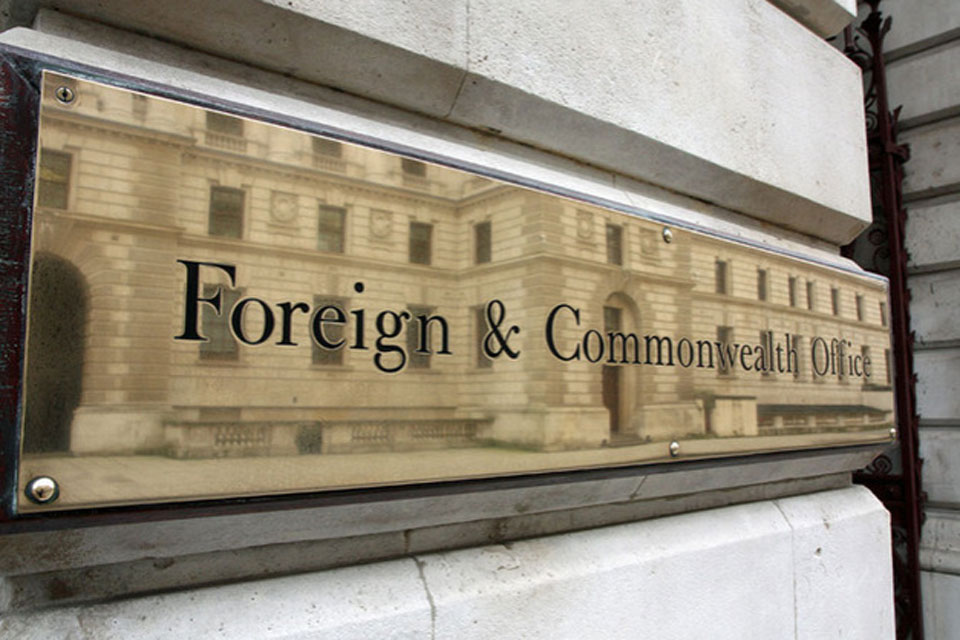Foreign Secretary statement on his visit to Oman, Iran and the UAE
Boris Johnson updated the House of Commons on his 8 to 10 December travel to the Gulf.

Mr Speaker, with your permission I will make a statement on my visit to the Middle East, from where I returned this morning.
This is a crucial time in the region: on the one hand we have a moment of hope, with scores of countries having come together to break the corrosive grip of Daesh on Iraq and Syria.
Britain’s armed forces have played a proud role in a military campaign that has freed millions - and Iraq’s government declared on Saturday that all of its territory had been liberated.
During her successful visit to Iraq last month, my Rt Hon Friend the Prime Minister thanked the British servicemen and women who have helped to bring about the territorial defeat of Daesh.
In Jordan, she reaffirmed Britain’s absolute commitment to the peace and stability of one of our closest allies in the region.
But the setbacks inflicted upon Daesh have coincided with a dangerous escalation of the war in Yemen, where one of the worst humanitarian crises in the world is now unfolding.
This morning, I returned from my first bilateral visit as Foreign Secretary to Oman, the UAE and Iran. My aim was to take forward Britain’s response – diplomatically and economically – to the crisis in Yemen.
The government strongly believes that the only way of bringing this tragic conflict to an end is through a political solution.
His Majesty Sultan Qaboos of Oman – whom I met in Muscat last Friday – entirely shared this analysis.
The Sultan and I discussed in detail the tragedy in Yemen, with which Oman shares a 180-mile border.
The Sultan and I also agreed on the importance of settling the dispute between Qatar and its neighbours and I was pleased to see that the summit of the Gulf Cooperation Council went ahead in Kuwait last week.
From Muscat I travelled to Tehran where I met Iran’s senior leadership including President Rouhani, Vice-President Salehi and the foreign minister, Javad Zarif.
I was frank about the subjects where our countries have differences of interest and approach, but our talks were constructive nonetheless.
The latest chapter of Britain’s relations with Iran opened with the achievement of the nuclear deal, the JCPOA, in July 2015.
In every meeting, I stressed how the UK attaches the utmost importance to preserving this agreement.
For the JCPOA to survive, Iran must continue to restrict its nuclear programme in accordance with the deal – and the International Atomic Energy Agency has verified Iran’s compliance so far - and other parties must keep their side of the bargain by helping the Iranian people to enjoy the economic benefits of re-engagement with the world.
The House knows of Iran’s disruptive role in conflicts across the region, including in Syria and Yemen.
Our discussions on these subjects were frank and constructive though neither I nor my Iranian counterparts would claim that we reached agreement on all issues.
If we are to resolve the conflict in Yemen, then Houthi rebels must stop firing missiles at Saudi Arabia and the House will recall that King Khalid International Airport in Riyadh - Saudi Arabia’s equivalent of Heathrow - was the target of a ballistic missile launched from Yemen on 4th November.
I pressed my Iranian counterparts to use their influence to ensure that these indiscriminate and dangerous attacks come to an end.
On bilateral issues, my first priority was the plight of the dual nationals behind bars.
I urged their release on humanitarian grounds where there is cause to do so.
These are complex cases involving individuals considered by Iran to be their own citizens – and I do not wish to raise false hopes.
But my meetings in Tehran were worthwhile and while I do not believe it would serve the interests of the individuals concerned or their loved ones to provide a running commentary, the House can be assured that the Government will leave no stone unturned in our efforts to secure their release.
I also raised with Mr Zarif the official harassment of journalists working for BBC Persian and their families inside Iran.
I brought up Iran’s wider human rights record, including how the regime executes more of its own citizens per capita than almost any other country in the world.
But where it is possible to be positive in our relations with Iran – for instance by encouraging scientific, educational and cultural exchanges –we should be ready to do so.
I then travelled to Abu Dhabi for talks yesterday with the leaders of the UAE, focusing on the war in Yemen, we agreed on the importance of restoring full humanitarian and commercial access to the port of Hodeidah, which handles over 80 per cent of Yemen’s food imports.
We also agreed on the need to revive the political process, bearing in mind that the killing of the former president, Ali Abdullah Saleh, by the Houthis may cause the conflict to become even more fragmented.
And we discussed how best to address the missile threat from Yemen, welcoming the United Nations investigation into the origin of the weapons that have been launched.
Our concern for the unspeakable suffering in Yemen should not blind us to the reality that resolving a conflict of this scale and complexity will take time and persistence - and success is far from guaranteed - but it is only by engagement with all the regional powers, including Iran, and it is only by mobilising Britain’s unique array of friendships in the Middle East that we stand any chance of making headway.
I am determined to press on with the task, mindful of the human tragedy in Yemen, and I shall be meeting my Gulf and American colleagues again early in the New Year.
I commend this statement to the House.